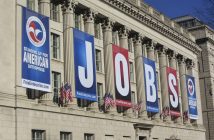Market-oriented libertarians love to argue that if we just opened our borders to anyone who wants to live in the United States, everything would work out fine, and everyone would get rich in the process. Take, for example, Dr. Bryan Caplan’s recent article in Foreign Policy magazine. He claims that open borders are not only the fairest course of action, but are also “the most promising shortcut to global prosperity.” According to Dr. Caplan, “The world’s nations, especially the world’s richest nations, are missing an enormous chance to do well while doing good.”
What’s the rationale underlying such extravagant claims? People are more productive in wealthy nations. For example, if you move a Haitian worker to the U.S., says Dr. Caplan, he/she immediately begins earning $25,000 per year as opposed to $1,000 per year. According to him, “The main reason Haitians suffer in poverty is not because they are from Haiti but because they are in Haiti. If you were stuck in Haiti, you, too, would probably be destitute.”
But that isn’t necessarily true. The Center for Immigration Studies has found that 63 percent of non-citizen households access welfare programs and they continue to do so even after 10-20 years in the U.S. People use public assistance programs either because they are unable to find work, or because they are not working in the most profitable jobs available to them. The rate at which immigrants use public assistance indicates that a significant number of them don’t actually become more productive when they enter the United States. In many cases, they actually become less productive, although their income may rise.
Moreover, if a low-skilled arrival does actually find work in the U.S., his real wealth may increase while his relative wealth may actually decline. Due to differences in the scale of each nation’s economy, it is entirely possible to immigrate to the U.S. and remain just as poor in relative terms. In other words, $25,000 may actually have less buying power in the U.S. than $1,000 does in Haiti. Comparing the American and Haitian economies is kind of like comparing apples and elephants.
But the biggest flaw in Dr. Caplan’s theory is his apparent belief that a massive influx of foreign laborers into the United States will neither lower wages, nor change the society that has made America profitable.
According to a recent Gallup poll, about 750 million people in the world would migrate to another country, given the chance. And their preferred destination is the U.S. As it is, American workers are experiencing wage depression because of the surplus of cheap, foreign labor created by our loose immigration policies. How would the labor market react if several hundred million new competitors were introduced into it? The simple law of supply and demand dictates that with a surplus of available workers, employers will lower the price they are willing to pay for a day’s labor.
More importantly, as Dr. Caplan admits, the United States is a better place to sell one’s labor than Haiti because of, “better government policies, better management, better technology, and much more.” What he fails to acknowledge, however, is that all of those better approaches are the direct result of the American form of government, which gives primacy to individual rights and places great importance on the notion of private property.
And that is exactly why borders and immigration controls are important. For it is our borders that denote the geographic zone within which American laws, policies and trade practices apply. Within those boundaries, we retain the right to enforce the American rules, values and morals that have made us a successful nation. One in which many foreigners wish to live. Were you to remove those boundaries, rather than creating wealth, you would generate anarchy. A state without borders is a state without the power to create the stability necessary for profitable commerce.




